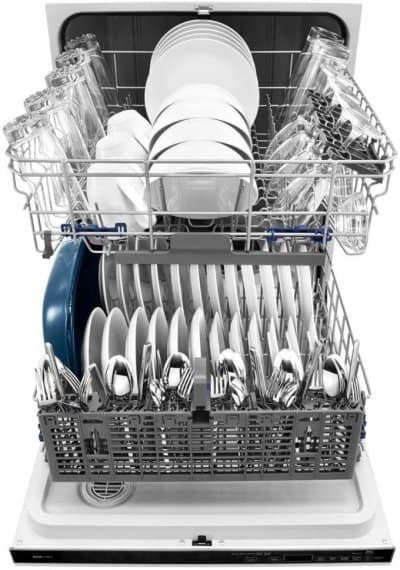Dishwashers are designed to clean and rinse dishes using a combination of water, detergent, and energy. The amount of water used during a dishwasher cycle depends on several factors, such as the dishwasher’s make and model, the selected wash cycle, and the dishwasher’s energy efficiency.
Table of Contents
Factors Affecting Water Consumption
- Dishwasher Efficiency: Energy-efficient dishwashers are designed to use less water by employing advanced technologies and optimizing the cleaning process. Look for dishwashers with the ENERGY STAR label, indicating their superior efficiency.
- Wash Cycle Selection: Different wash cycles, such as normal, heavy, or eco-friendly, consume varying amounts of water. Eco-friendly or energy-saving cycles typically use less water compared to intensive cycles.
- Load Size: The number of dishes and utensils loaded into the dishwasher affects water usage. Running a full load is more water-efficient than running multiple smaller loads.
- Pre-Rinsing Habits: Pre-rinsing dishes before loading them into the dishwasher can increase water consumption unnecessarily. Scraping off excess food particles is usually sufficient, as modern dishwashers are equipped to handle dirty dishes effectively.
Water Efficiency Labels and Standards
To promote water efficiency and help consumers make informed choices, various countries have introduced water efficiency labels and standards for dishwashers. These labels provide valuable information about the appliance’s water consumption and overall efficiency. When purchasing a dishwasher, look for labels such as WaterSense in the United States or the WELS (Water Efficiency Labelling and Standards) scheme in Australia.
Average Water Usage of Dishwashers
The average water usage of dishwashers can vary depending on the factors mentioned earlier. However, as per industry standards, a standard dishwasher typically uses around 4 to 6 gallons (15 to 23 liters) of water per cycle. This estimate is based on an average load and a regular wash cycle. Energy-efficient models can use as little as 3 gallons (11 liters) of water per cycle, further reducing water consumption.

Tips for Reducing Water Consumption
- Choose Energy-Efficient Dishwashers: Opt for dishwashers with the ENERGY STAR label, as they are designed to use less water and energy while providing efficient cleaning.
- Run Full Loads: Utilize the full capacity of your dishwasher before running a cycle. This ensures maximum efficiency and reduces the number of cycles needed.
- Skip Pre-Rinsing: Avoid pre-rinsing dishes unless necessary. Scrape off excess food particles instead, as modern dishwashers are equipped with powerful jets and sensors to tackle dirty dishes effectively.
- Use Eco-Friendly Wash Cycles: Whenever possible, select eco-friendly or energy-saving wash cycles. These cycles are specifically designed to minimize water usage.
- Regular Maintenance: Keep your dishwasher in optimal condition by cleaning the filter and ensuring proper water flow. A well-maintained dishwasher operates efficiently and uses water more effectively.
The Impact of Water Usage on the Environment
Reducing water consumption is not only beneficial for our household bills but also crucial for environmental sustainability. By understanding how much water our dishwashers use and implementing water-saving practices, we can collectively contribute to conserving this precious resource. Conserving water helps mitigate water scarcity, preserves ecosystems, and reduces energy consumption associated with water treatment and distribution.
How much water does a dishwasher use?
The amount of water a dishwasher uses depends on the type and size of the machine. Most standard-size dishwashers use between 6 and 15 gallons of water per cycle. High-efficiency models use even less, typically around 3 to 6 gallons per cycle. To further reduce water consumption, some newer models have sensors that detect the amount of soil on dishes and adjust the water accordingly. Additionally, many states have adopted standards that require dishwashers to use no more than 5 gallons per cycle.
Regardless of the model, most dishwashers are designed to be more efficient than hand washing dishes in terms of both energy and water usage. According to the US Environmental Protection Agency, a full load of dishes washed in a dishwasher can use up to 50 percent less water than washing them by hand. This means that using a dishwasher rather than hand washing your dishes can save you up to 10 gallons of water per load!
Are newer dishwashers more water-efficient than older models?
Yes, newer dishwashers often come with advanced technologies that improve water efficiency. Look for ENERGY STAR certified models for optimal water savings.
Can I use my dishwasher for smaller loads to save water?
It’s generally recommended to wait until you have a full load before running the dishwasher. Running smaller loads may not be as water-efficient.
Is it necessary to rinse dishes before loading them into the dishwasher?
Pre-rinsing is usually unnecessary with modern dishwashers. Simply scrape off excess food particles to ensure effective cleaning.
How can I check the water efficiency of a dishwasher before purchasing?
Look for water efficiency labels such as WaterSense (USA) or WELS (Australia). These labels provide information about water consumption and overall efficiency.
Can reducing water usage in dishwashers help lower my utility bills?
Absolutely! Using water-efficient dishwashers and following water-saving practices can lead to significant savings on your water and energy bills.
Conclusion
In conclusion, the amount of water a dishwasher uses per cycle depends on various factors such as efficiency, wash cycle selection, and load size. Energy-efficient dishwashers and eco-friendly wash cycles can significantly reduce water consumption, promoting sustainability and cost savings. By adopting simple habits like running full loads and avoiding unnecessary pre-rinsing, we can optimize our dishwasher’s water usage. Let’s make conscious choices and contribute to a more sustainable future by efficiently managing our water resources.

